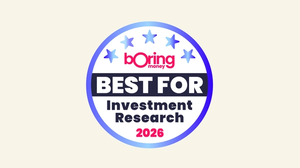How to match your investments with your values
5 killer questions with Schroders' Emily Peterson
By Boring Money
6 July, 2023
Our Founder & CEO Holly Mackay was joined by Schroders’ Portfolio Director Emily Peterson to discuss her 5 killer questions to ask yourself when building a sustainable portfolio. Watch the video below or scroll down for a summary!
If you have decided you want to invest responsibly, and that it matters to you to do the right thing for people and planet with your future savings, how do you go about ensuring your portfolio isn't falling foul of greenwashing...? Start by asking the following five questions.
Question 1: Do you want to exclude the nasties?
Emily’s first killer question is to understand whether or not you want to exclude the nasties, or if you think that taking a longer-term view and putting your money behind those companies with a clear transition plan is a better approach.
Digging into the details on transitioning companies can be tricky. Though most of us tend to point the finger at fossil fuel companies as key culprits in the climate change blame-game, we tend to overlook who finances them. A lot of the time, it’s the big banks. For example, according to Banking on Climate Chaos – Fossil Fuel Finance Report 2022, Barclays are Europe’s largest fossil fuel financer and JP Morgan is the world’s largest financer.
So the banks have a crucial role to play if we want to move towards a more sustainable world, but a useful distinction to make when considering investing in banks and how much fossil fuel production they finance is their starting point.
It’s more reasonable for banks in emerging markets to have a higher exposure to coal, for example, than it is in the UK where there is a bigger renewable energy market. So you could look at what % of a bank’s loans are given to fossil fuel companies, as a % of its total loans, and keep track of these commitments.
Question 2: Are there specific themes you want to invest in?
The United Nations’ 17 Sustainable Development Goals (SDGs) can be a great way to think about themes and many managers will align their portfolios to these. The UN also estimate that between $2 - 3bn per year will be spent on moving towards these goals.
Good health and wellbeing, for example, is a very investible theme. Covid exposed many countries for underinvesting in health and the opportunities are clear. Other themes include the eradication of poverty, affordable and clean energy, and gender equality. Have a think about what resonates with you most!
Many sustainable funds will note their alignment to the various SDGs in either their factsheets or annual sustainability reports, so that’s the place to go to initially for this information.
Question 3: Is your fund manager/provider using their influence to encourage progress?
Is your fund manager or provider using their influence to encourage progress within the companies they are invested in, and holding them to account when they’re not? This is particularly important if you’re opting to invest in transitioning companies, where there is the risk that they may not stick to their commitments or proposed timelines.
Using your influence as a shareholder is often referred to as ‘engagement’ or ‘active ownership’ and is a great way of finding out if your fund manager or provider is using their collective financial muscle to encourage change for the better on issues such as diversity, workers’ rights or climate commitment.
For example, Amazon is a company which Schroders actively engages with. Many may think that they are making positive change with renewable energy and recyclable packaging, but are generally seen to be lacking on workers’ rights. Though they are typically included in many sustainable portfolios, there are question marks about their record across all ESG issues, and Schroders has previously used their voting rights to drive change at Amazon’s Annual General Meeting.
To make sure that your fund manager or provider is really walking the walk, get familiar with the escalation process which involves writing to the Board, joining forces with other managers, writing to the Chairman, and public declarations of voting against management.
Question 4: Are your investments diversified enough?
Diversification is arguably more important than ever for investors in sustainable funds, especially when you peek at the top holdings of many themed funds to find that technology companies are exceedingly common. To make matters worse, many of these tech firms behave in a similar way, which could leave you vulnerable if technology stocks hit a rough patch in global markets.
To combat this and protect yourself, you need to consider properly diversifying and holding other assets, to spread your risk across a range of investments. Green bonds are one example of an investment which behaves differently to technology stocks, as do alternative assets such as infrastructure.
However, building your own sustainable portfolio can be a bit of a brain fry. If so, consider a sustainable ‘multi-asset fund’. With this option, you pay a fund manager to effectively do the hard work for you, picking a huge range of funds and assets and packaging them up in one easy option which they monitor and rebalance on an ongoing basis. It’s then left to them to worry about diversification and managing risk for you.
Question 5: Could you add infrastructure to your portfolio?
If you’re looking for different sorts of assets to include in order to diversify your portfolio, other than the more traditional options of shares and bonds, infrastructure is one to consider. These will often pay an annual coupon (think of this like an interest payment) which is commonly linked to inflation.
Many trusts focus on renewable energy – perennial popular options include Greencoat Renewables, Greencoat UK Wind, Octopus Renewable Energy Infrastructure Trust and Renewable Energy Infrastructure Group.
But, for a slightly different flavour, in 2020 Schroders and Big Society Capital launched a social impact trust which provides housing, lends money to social enterprises and charities. The returns are not as high as we might expect from comparable share portfolios, so you’re looking at a target range of inflation plus 2%, but the key point is these behave differently to the mainstream stock market. So you’re not putting all your free range eggs in one basket!
Discover our top picks for sustainable investors
Thinking about investing sustainably but not sure who to turn to? In a world of greenwashing and technical jargon, it can be tough to tell who really does what they say on the tin. That's why we have a dedicated 'Best for Sustainable Investors' category in our annual Best Buy Awards to recognise the providers that have excellent content and filters to help you find credible sustainable investments and funds.
Join Boring Money
Already have an account? Login




